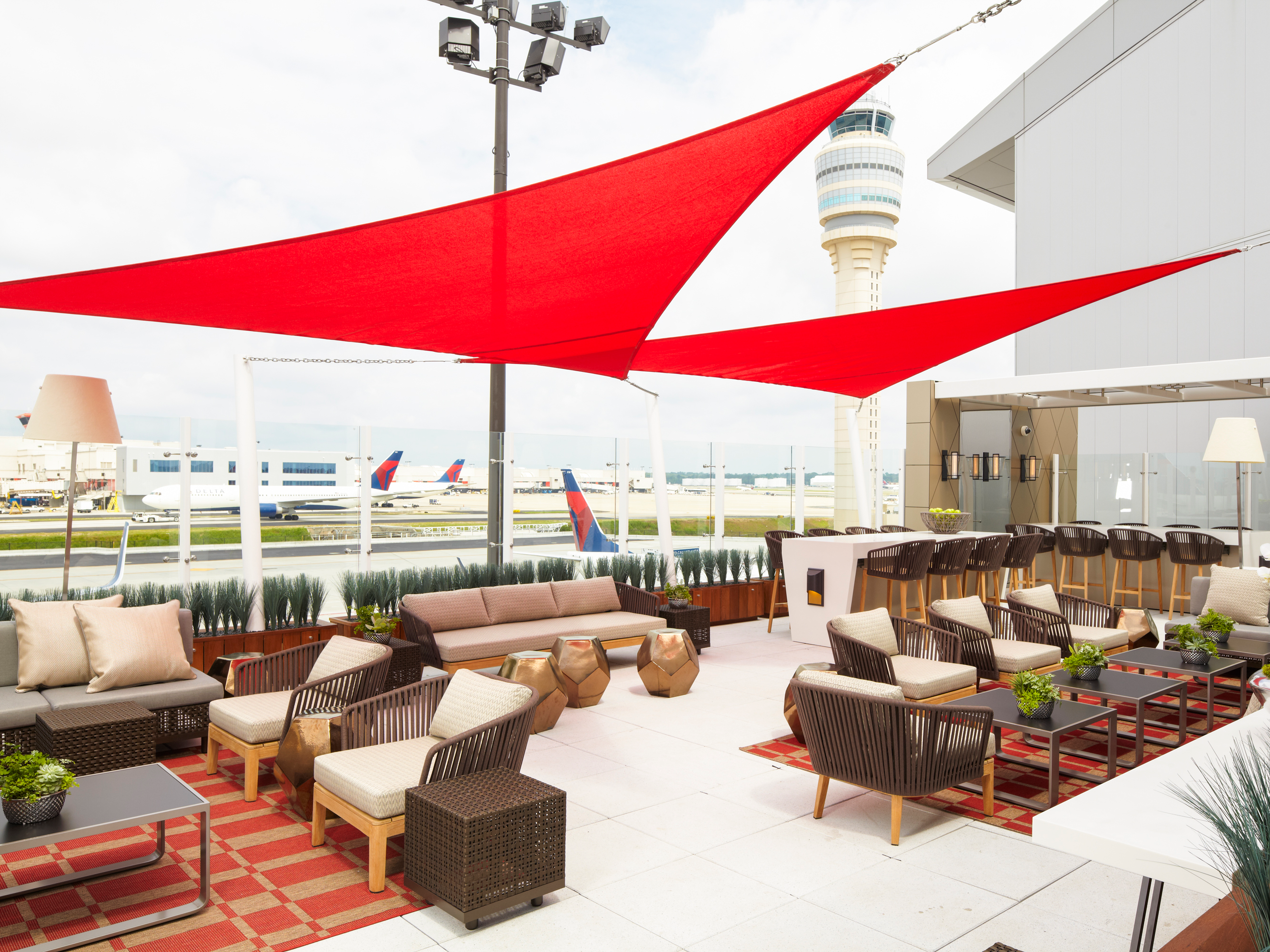- The Platinum Card® from American Express and the Delta Reserve® Credit Card from American Express both offer free access to Delta Sky Club airport lounges whenever you fly with the airline.
- Both are considered premium cards, but other than Sky Club access, they have differing perks, benefits, and rewards.
- The Platinum Card is likely the best for most people, but hardcore Delta loyalists might find enough value in the Delta Reserve to make that card worth getting.
The American Express Platinum Card and the Delta Reserve Credit Card have a lot in common. They both have high annual fees putting them squarely in the “premium” card space, they both get you access to Delta Sky Club airport lounges when you fly Delta, and they’re both issued by American Express.
The fact that both get you access to Delta Sky Clubs means that people often look at the two cards as relatively interchangeable. However, the two cards are actually pretty different. Here’s what to consider when deciding between the two.
Amex Platinum vs. Delta Reserve: Comparing welcome offers
The Platinum Card has a standard welcome bonus of 60,000 Membership Rewards points after you spend $5,000 on the card in your first three months. Before you apply, though, check the CardMatch tool to see if you’re eligible for a higher offer of 100,000 points with the same spending requirement.
Meanwhile, the Delta Reserve is offering 40,000 Delta SkyMiles and 10,000 Medallion Qualification Miles (MQMs) when you spend $3,000 in the first three months. It occasionally offers an elevated bonus of 75,000 miles and 5,000 Medallion Qualification Miles (MQMs) when you spend $5,000 in the first three months, but that’s not currently available.
The Platinum card actually beats the Reserve for earning points on Delta flights
The Platinum Card earns a whopping 5x points on flights purchased directly from an airline or through Amex Travel services. It also earns 5x points on prepaid hotels booked through Amex Travel, and 1 point per dollar on everything else.
Amex Membership Rewards points can be transferred to a handful of airline frequent flyer partners, including Delta.
That means that the Platinum Card actually beats the Delta Reserve for earning on Delta flights - the Reserve only offers 2 miles per dollar spent on Delta, and 1x mile on everything else.
The Platinum card offers more extensive lounge access
Both the Amex Platinum Card and the Delta Reserve Card offer access to Delta Sky Club lounges, as long as the cardholder is flying with Delta that day.
However, the Platinum Card also offers access to Amex's network of Centurion Lounges. There are currently eight locations in the US, one in Hong Kong, and more set to open in the near future, with more likely on the way. While these lounges can sometimes get a bit crowded - Amex has recently expanded several locations to better handle their popularity - they offer ample seating, fast Wi-Fi, complimentary meals, cocktails, and coffee, and snacks.
The Platinum Card also comes with a complimentary membership in Priority Pass, a network of more than 1,200 airport lounges around the world, including 60-70 in the US (lounges occasionally join or leave the program). Several other cards, like the Chase Sapphire Reserve, also include this, and Priority Pass is actually more limited on Amex cards, because Amex recently eliminated non-lounge Priority Pass access, so airport restaurants are excluded from your membership.
There are also international Amex-branded lounges you can access as a Platinum cardholder, including in Mumbai, Delhi, Buenos Aires, Mexico City, Sydney, and, most recently announced, Melbourne.
Then, there are a handful of other random lounges, including ones that fall under the Plaza Premium, Air Space, and Escapes brands - these number more than 50.
Overall, the Platinum Card's lounge access is significantly more extensive - if you prioritize the greatest access, don't always fly Delta, and want to enjoy Centurion Lounges, the Platinum Card is the best option. However, if you only fly Delta and mainly visit airports with Sky Clubs, the Reserve should suffice.
Both cards offer in-flight perks
One of the Platinum Card's benefits is up to $200 each calendar year in airline fee credits. Each year, you choose one US airline for the credits to apply. Then, anytime you use your card for things like on-board food or drinks, upgrades to extra leg-room seats, checked bags, lounge passes for guests, or other expenses, the credit will be automatically applied.
The Delta Reserve offers a handful of direct benefits anytime you fly Delta. You'll get one free checked bag for each person on the cardholder's reservation (up to nine people total), priority boarding so you can settle in sooner and snag space in the overhead compartments, a 20% discount in the form of a statement credit on Delta in-flight purchases, and no foreign-transaction fees.
The Reserve also offers a potentially big, rarely discussed perk for Delta Medallion, or elite, frequent flyers.
Delta Medallion flyers are eligible for complimentary, space-available upgrades to first class and Delta One on flights within the US and the region, including Mexico and Central America, and extra-legroom seats on international flights.
Upgrades clear in hierarchical order based on a number of factors, including each passenger's Medallion status level, the original fare class they booked, and a few other factors. The first tiebreaker for people with the same Medallion level and fare class: whether they hold the Delta Reserve card. Reserve cardholders will be prioritized over those without. If there's only one seat left and two members are still tied and both have the Reserve, it continues down the list of tiebreakers.
For travelers who fly a lot and frequently find themselves one or two upgrade-list spots away from getting that first-class seat, holding the Reserve can be extremely valuable.
Both cards have high annual fees
As premium cards, both the Amex Platinum and the Delta Reserve have high annual fees, but the benefits may make up for them.
The Amex Platinum's fee is $550. However, this is offset by up to $200 in airline fee credits each calendar year, up to $200 in Uber credits each cardmember year, up to $100 in shopping credits each year, and benefits like lounge access and rewards. When you factor in the statement credits, the annual fee is virtually wiped out, making it a positive value for any user who can use the full credits.
The Delta Reserve's fee is $450. It doesn't have comparable annual credits, but the benefits like lounge access and upgrade priority makes the fee worthwhile for some.
The Reserve offers an MQD waiver and bonus MQMs
Each level of Delta Medallion frequent flyer status requires you to have flown and spent a certain amount with the airline. Medallion Qualification Miles, or MQMs, are earned based on how many miles you fly with Delta (or partner airlines). The first level of Medallion status, Silver, requires 25,000 MQMs. Medallion Qualification Dollars, or MQDs, are based on how much you've spent. In most cases, MQDs are earned based on the ticket price paid, excluding taxes and fees that can make up a significant portion of the ticket. Silver Medallion requires 3,000 MQDs.
When you have the Delta Reserve (or the mid-tier Platinum Delta SkyMiles® Credit Card from American Express), and you spend $25,000 in a calendar year, you'll be waived from the coming year's MQD requirement for any Medallion level except for the highest (Diamond).
If you have the Reserve and spend another $5,000, for a total of $30,000 in a calendar year, you'll get a bonus of 15,000 MQMs and 15,000 redeemable SkyMiles.
As an airline-agnostic card, the Amex Platinum Card doesn't offer anything comparable. However, only big spenders and frequent Delta flyers who wouldn't otherwise qualify for the next level of status can make use of this benefit.
Platinum also offers hotel benefits, PreCheck, and Global Entry
The Platinum Card comes with complimentary Gold-level elite status in both the Hilton Honors and Marriott Bonvoy loyalty programs. If you stay at hotels even a few nights a year, these benefits can be extremely valuable - especially because Hilton Honors Gold status entitles you to free breakfast, which can save a lot of money each morning.
TSA PreCheck and Global Entry (which comes with PreCheck) are absolute musts for just about any traveler. Once you enroll, you can use special lanes to breeze through airport security - you won't have to remove shoes and light coats, and you can leave your laptop in your bag. With Global Entry, you can use a fast lane when you return to the US from abroad, which makes clearing immigration and customs easy and quick. The programs cost $85-$100, and American Express will provide an up-to-$100 credit for that fee every four years (memberships are valid for five years).
Amex also offers Platinum cardmembers access to the Amex Fine Hotels & Resorts program. When you book participating hotels through Amex Travel (there are nearly 1,000 worldwide), you'll enjoy valuable perks including room upgrades, free breakfast, late checkout, free Wi-Fi, and a unique amenity at each hotel, like a credit to use at on-property spas or restaurants.
Reserve also offers a free annual companion pass for domestic flights
Each year on your Delta Reserve cardmember anniversary, you'll get a complimentary domestic companion pass, good for a first class or main cabin round-trip within the continental US.
A companion pass is essentially a buy-one-get-one-free coupon. When you book flight for yourself anywhere within the continental US, you can get a second ticket for free, other than minimal taxes and fees. The Platinum Delta SkyMiles card also comes with a companion pass, although that one is only good for economy flights.
Bottom line: Both cards are useful if you fly Delta
Both cards come with useful benefits for anyone who flies Delta. Which card is better ultimately comes down to personal preference and your own travel habits.

